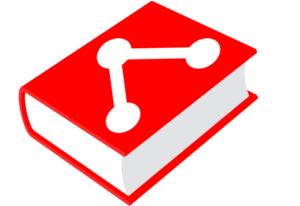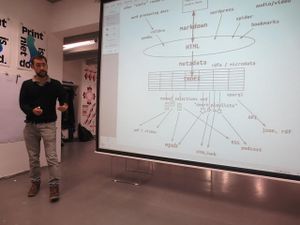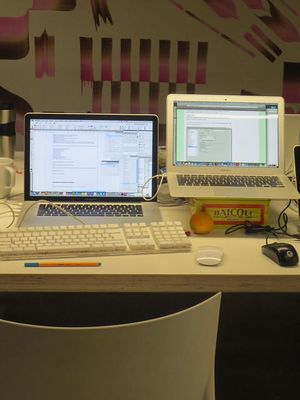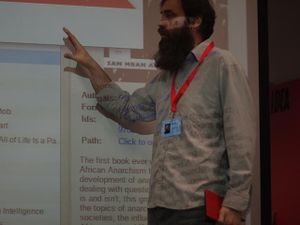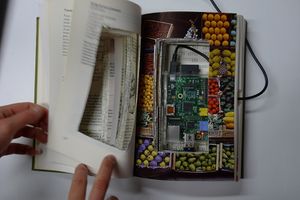Free Libraries for Every Soul
Free Libraries for Every Soul
2013.11.09
This past week I participated in the hackathon Free Libraries for Every Soul, in Utrecht, integrated in the Impakt festival.
Coordinated by Femke Snelting and Marcell Mars, the hackathon proposed an investigation into forms of access to books, mostly digital, but also in the intersections from digital and paper books. In more practical terms the projects developed, were tacking issues within the ecosystem of digital publishing,namely on the areas of input , metadata, and distribution.
The input segment focused on the scanning, creation, and conversion of digital books.
Within it the project A manual for scanning books, worked on the creation of a FLOSS manuals website, which will soon be added to the FLOSS manuals website very soon. I found particularly interesting the various fields of knowledge that can contribute to a book scanning project, from the construction of a book scanner, to the automation of the image processing, to the optical text recognition, to the design of the final digital book. The groups presentation sparked an interest discussion in relation to the difficulties the group was facing, when trying to place the optical recognized text onto the image pdf resulting from the scan. In response some of the participants, jumped to ask why go through such an effort, to place ocred plain text over an image pdf, and not simply use the ocred text to generate an epub, which is also text based, rather that image based, like a pdf. The answer from Tomislav Medak, concerned the non-existance of page numbers in epubs, and the consequent difficulty in referencing epubs. Against which Dubravka Sekulić replied, that pdfs are impossible to read on most ereaders, and therefore efforts should be put on epubs. As I see it the pdf is not such a comfortable or convenient format to read, except when printed, and that perhaps a system for giving locations for referencing in an epub could be developed. I will be waiting for the manual on book scanning, and if time allows me, also try to start a book scanning project.
The Joy of Text (Cooking with epub) approach was as diverse as were the project aims. Having as common and binding element the epub format the group splat its efforts on two tasks. On the one hand they worked on converting a publication from The Institute for Network Cultures, whose source was an InDesing file, and on the other hand they experimented with alternative ways of navigating and presenting an epub. The conversion from InDesign seemed a long and painstaking process, taking two days to reach its final goal, which rightly observed by Marcell Mars seems illogical when compared to the two hours which take on average to scan a book; And it show how problematic it can be to archive book projects in InDesign closed files - What other software is able to open them besides InDesign? Will the files still be readable in ten years time? How can one easily retrieve a small chunk of text from it? - are some of the questions that immediately come to mind, and reveal the fragility and practicalities of a close file format, as source-file for books.
The other part of the group was immersed in wild experiments with the content of an existing epub. Essentially they were looking at other possible indexes of a book, besides the usual authors and subjects. Elements like images, keywords, metadata, and references, can easily be retrieved from a epub due to its text based and hierarchical structure (in essence HTML). So if one wants to query all the images included the book, one only has to query the tag. As I see it, this approach creates very interesting possibilities for navigating, reading and using a digital book. It is like bursting the pages of a paper book, changing its order and the emphasized elements, to create alternative narrative flows. Very inspiring!! More on their work at http://digitalpublishingtoolkit.org/
The Joy of Text (Cooking with epub). Photo by Femke Snelting OSP dedicated their time to working on a project Etherpad-to-print, which they have been developing to provide a printable and appealing rendering of Etherpad's collectively written documents. Personally, the most interesting approach the project proposed was possibility the visualization of the author of each section of the text, by placing small name indication above the text of each author. This approach seems a simple and clever solution to prevent collectively created documents to result in a single anonymous voice, and instead present, in the document, the ongoing dialog between its authors. Perhaps this is something Wikipedia could adopt as a strategy to reveal that many voices and opinions that partake in the creation of an article to become visible, and turn it more into a place of discussion than a fictitious universal knowledge repository.
Moving on to the metadata, but already with a foot on distribution was An interface to the Memory of the World. This project aimed to take the current digital public library Memory of the World and expand its current user interface, so that both metadata and content of the books present, would be represented in the visual presentation of those books within Memory of the World's user interface. The group worked on using the number of pages of a book to change the size of the image representing the book. Another approach was to make the format of the book (pdf, epub, mobi) be immediately visible from its visual representation. The possibilities seem endless and I can't wait to these strategies start to shaping the Memory of the World's collections.
Fully within distribution was the group working on Lets Share Books - Calibre Plug-in. Lets Share Books is one of main components of the previously mentioned Memory of the World. Essentially it allows the peer-to-peer sharing of books through Memory of the World's interface, by extending the capabilities of Calibre e-book library manager. The plugin pushes Calibre server capacities from a local network to an server in the Internet, which allows our personal e-books collection to be shared with the world. The group worked on reformulating the plugin functionality to optimize metadata harvesting, and other features. While the new version is not out yet, the current one is running, and ready to let our e-books circulate and be shared with the world.
Lets Share Books - Calibre Plug-in. Photo by Michael Murtaugh Bibliotecha proposed to create local, off-line digital library. Visible to the exterior world as an open hotspot, Bibliotecha prompts any user connected to the hotspot to either the possibility of donating or retrieving an e-book. Having worked within this project, it was surprising how much the work consisted on getting two software packages - Calibre, for the addition, retrieval, and sorting of the library, and Recoll to search within the book content, to do what was required. Besides that there was a bit of DNS magic, an HTML page, a python script, and not much more. The downside of the project was the hardware, the choice of a Raspberry pi to run the library made what happens instantly over a laptop, take around 5 minutes on the pi. A few tests are still needed in order to lookout for bugs, but hopefully in a couple of weeks, a image of the whole library will be out, which can then be run on any pi. I can only imagine small local digital libraries popping up around town, and the many unexpected and interesting book making their way into these small digital libraries.
Bibliotecha. Photo by Yoana Buzova Library of New Babylon project, created a very interesting link and intersection with the Bibliotecha. The former aimed to develop a protocol to allow two libraries, like Bibliotecha, within the same local area to start sharing e-books with each other. The exchange between the libraries, is handled by Forban, a software tool designed to announce, discover, search or share files off the Internet, and within the local area. I can only imagine how much fun it will be to jump on a train with my digital library on, and because someone else also has another library on, our collections are swapped, without we ever knowing from where they came from. It's case to say "show me your library and I will tell who you are".
2013_11_09 Blog

